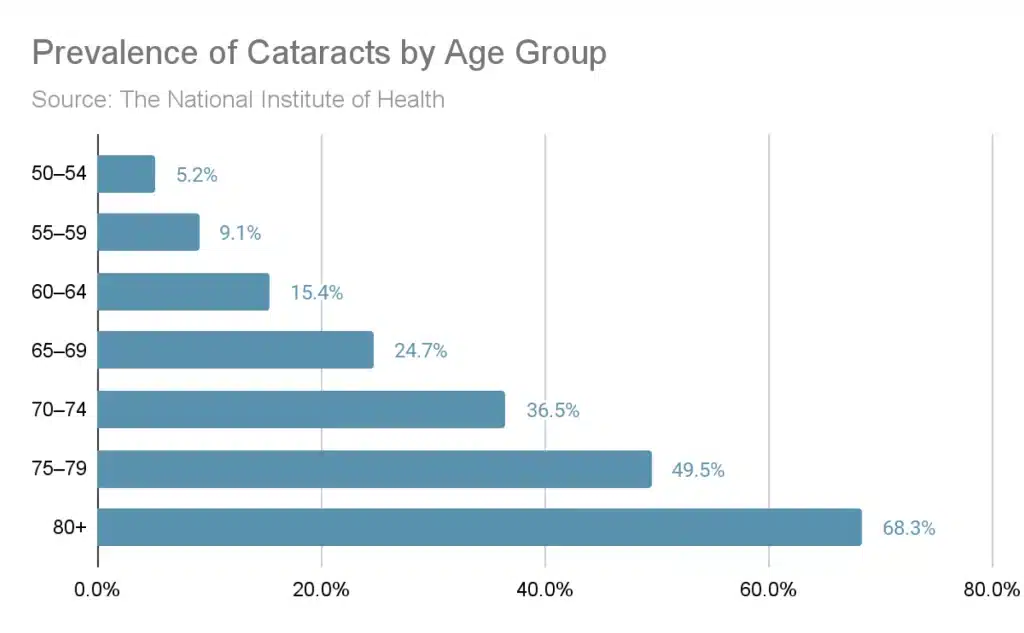Medically Reviewed by: Mark L. Mayo, M.D.
What is the Average Age for Cataract Surgery?
Whether you’re approaching your forties or fifties and are concerned about developing cataracts in the future, or you’re 60+ and you’ve begun to notice problems with your vision, you may be asking yourself “What is the average age for cataract surgery?” Or, more importantly, “When should I have cataract surgery?”
While many people can develop cataracts as early as their forties, prevailing data suggests that the average age for cataract surgery is around 65. In this article, we will look at some of the data surrounding when and why people opt for cataract surgery, early signs of cataracts, and what to expect when you make your appointment.
Prevalence of cataracts by age
Roughly 90% of people will develop cataracts by the age of 65. Like other age-related degenerative conditions, the chance of cataracts occurring only increases the older a person gets. Per the National Institute of Health, the prevalence of cataracts by age rapidly increases with every decade of life. This means that the likelihood of needing cataract surgery at age 60 or cataract surgery after 70 is far higher than seeing a doctor about your cataracts at age 50.

What is the youngest age for cataract surgery?
Because cataracts develop over time and tend to affect older people more than they affect younger people, surgery may not be required for younger people in the early stages. And while it’s certainly never too early to get cataract surgery, waiting too long can greatly reduce the procedure’s effectiveness.
Many people who are younger than the average age for cataract removal, say in their forties and fifties, may put off getting surgery for their cataracts for a number of reasons. Maybe the cataracts don’t greatly affect their vision or quality of life, or maybe they’re worried their cataracts will return after the procedure. If you or a loved one is wondering, “Can cataracts come back after surgery?” you’ll be relieved to know that the answer is no.
Because there’s no risk of cataracts returning post-surgery, is it better to have cataract surgery early for several reasons. First, getting cataract surgery earlier in life means clearer vision later in life. Rather than dealing with increasingly cloudy vision as you age into your golden years, you can make the choice to get surgery early and maintain your quality of life and independence.
Additionally, although the procedure is short and relatively noninvasive, healing from surgery tends to be easier and faster for younger people than it is for older people.
Continue reading: Can you wait too long to have cataract surgery?
How do you know when it’s time for cataract surgery?
Sooner or later, nearly everyone will develop cataracts as they age into their sixties and seventies. And if you were wondering whether there is a non-surgical, natural remedy for cataracts, there isn’t one. You’ll know when it’s time for cataract surgery by reviewing the following questions:
Are my cataracts making my life difficult?
Cataracts can significantly impact quality of life by causing blurred vision, difficulty reading, and reduced ability to drive safely. They can also affect daily activities where vision is important, but often taken for granted. For example, something as simple as cooking dinner can become challenging due to impaired depth perception and foggy vision. Watching television or enjoying hobbies like painting can become frustrating due to decreased visual clarity.
If left untreated, cataracts can also impact other, more serious aspects of life. They could lead to an increased risk of falls and accidents, particularly in dimly lit environments. They can also make recognizing friends and loved ones more challenging, or increase eye strain at work.
Do I have a hard time seeing at night?
Cataract-related difficulty seeing at night can significantly affect one’s safety and quality of life. Impaired night vision increases the risk of accidents, especially while driving or navigating in low-light environments. Since nighttime visibility is crucial for many activities and responsibilities like driving or even moving around the house safely, cataract-related vision problems can severely limit independence and confidence.
If you’re having difficulty seeing at night due to cataracts, treatment might be the next logical step. By removing the cloudy lens and replacing it with a clear artificial lens, cataract surgery improves night vision, enhancing safety and allowing individuals to resume their normal activities with greater ease and confidence.
Am I sensitive to glare?
Cataracts can cause sensitivity to light and glare due to the changes they induce in the eye’s lens. As cataracts develop, the normally clear lens becomes cloudy, resulting in light scattering inside the eye. This scattering of light causes increased sensitivity to bright lights and glare.
As a result, individuals with cataracts may find it challenging to tolerate bright environments, leading to avoidance of outdoor activities or difficulty driving at night due to the intense glare from oncoming headlights. Cataract surgery often resolves this sensitivity by replacing the cloudy lens with a clear artificial lens, restoring the eye’s ability to properly focus light onto the retina and reducing sensitivity to light and glare.
Are there vision differences between my eyes?
In some cases, cataracts may develop at different rates in each eye, leading to variations in visual acuity between them. One eye might have a more advanced cataract, resulting in more significant vision impairment compared to the other eye.
The location and severity of cataracts within each eye can vary. If a cataract is located in the central part of the lens in one eye but more peripherally in the other, it can lead to differences in visual clarity and focus. Moreover, factors such as astigmatism or pre-existing differences between the eyes can worsen the discrepancy in vision caused by cataracts.
Addressing disparate levels of vision due to cataracts may require customized treatment plans, such as cataract surgery tailored to the specific needs of each eye, to achieve balanced and optimized vision between the two eyes.
Eye Center of Texas is ready to answer all of your cataract surgery questions
Now that we’ve discussed the average age for cataract surgery, if you have cataracts, but you’re not at the average age for cataract removal, you can still benefit from setting up an appointment with an eye surgeon. Cataract surgery is a fast and relatively pain-free procedure that can dramatically improve both your vision and your overall quality of life.
The acumen of our cataract surgeons speaks for itself. Our Houston cataract surgeons — such as Dr. Mark L. Mayo, Dr. Yasir Ahmed, and Dr. Edward C. Wade — have completed thousands of successful cataract procedures, and left thousands of patients happy.
Put your eye care into the hands of surgeons you can trust at Eye Center of Texas. We offer cataract surgery at our locations throughout Texas including Houston/Bellaire, Pasadena, Sugar Land, Clear Lake, Katy, and The Woodlands/Conroe. Request an appointment today to see if you are a candidate!
More Helpful Articles by Eye Center of Texas:
- How Old Do You Have to Be to Get LASIK?
- What To Do About Double Vision After Cataract Surgery
- Why Is My Vision Getting Worse?
- Why Patients Say We Are the Best Ophthalmologists in Texas
- 7 Things To Do When Preparing for LASIK Surgery
Related Articles
Financing Options Available
Apply today to find a financing option that meets your needs.
Our Locations
Houston/Bellaire
6565 W. Loop S., Suite 650Bellaire, TX 77401
Medical Office:
713-797-1010
Medical Fax:
713-357-7276
LASIK/Near Vision:
Office: 713-395-1515
Fax: 713-357-7278
Pasadena
4415 Crenshaw RoadPasadena, TX 77504
Medical Office:
281-977-8800
Medical Fax:
281-977-8877
Sugar Land
15200 S.W. Freeway, Suite 130Sugar Land, TX 77478
Medical Office:
281-277-1010
Medical Fax:
281-277-4504
Clear Lake
455 E. Medical Center Blvd., Suite 110Webster, TX 77598
Medical Office:
281-332-1397
Medical Fax:
281-282-9152
Katy
Greenhouse Medical Plaza2051 Greenhouse Road, Suite 110
Houston, TX 77084
Medical Office:
346-547-7070
Medical Fax:
281-214-2971
The Woodlands/Conroe
100 Medical Center Blvd., Suite 118Conroe, TX 77304
Medical Office:
936-647-1610
Medical Fax:
936-647-1620


